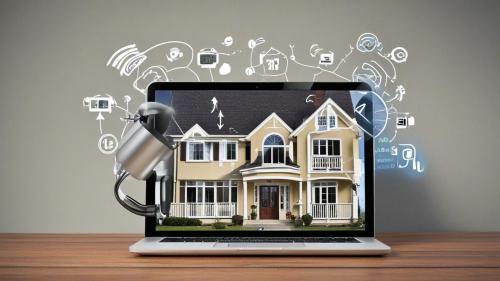The concept of a smart home, equipped with interconnected devices that offer seamless communication and automation, is transforming the landscape of home security. As technology progresses, the question isn’t just about whether smart homes are secure, but rather, how to enhance their safety further.
According to recent surveys, the adoption of smart home devices is rapidly increasing as homeowners look for convenience and innovative ways to secure their properties. From smart locks, surveillance cameras, to alarm systems that you can control with your smartphone, the tools at our disposal are more sophisticated than ever.
One key element that appeals to tech-savvy homeowners is the ability to remotely monitor and control their home security setup. Imagine being on vacation in a different country and having the ability to check the security feed of your home or receive notifications if someone enters your property. This has not only changed how we approach security, but how we live our daily lives.
However, with greater connectivity comes new vulnerabilities. Cybersecurity experts emphasize the importance of securing devices against potential breaches. Hackers can exploit weak spots in smart home networks, leaving your home vulnerable to digital intrusions.
Thus, the challenge lies in balancing convenience with security. It’s crucial for users to regularly update their systems, use strong passwords, and consider investing in a dedicated home firewall to protect against cyber threats.
Another intriguing aspect is how artificial intelligence (AI) is being integrated into home security. AI technology is capable of recognizing usual patterns and flagging anomalies. Imagine a security camera that can distinguish between a family member arriving home and a stranger lurking suspiciously. These advancements offer a considerably higher level of security assurance.
Voice assistants, popular for their ease of use, are now being incorporated into security systems allowing for voice-activated alarms or door locks. While they offer hands-free convenience, it's pertinent to ensure these devices are properly secured since they also present potential entry points for hackers.
Moreover, the integration of smart lighting within home security systems is not just about illumination. These lights can simulate presence by turning on and off at random intervals when the homeowner is away, deterring potential intruders.
An increasing number of smart home security systems also feature environmental monitoring, adding extra layers of protection. These systems can detect smoke, gas leaks, or even drastic temperature changes, alerting homeowners to hazards beyond burglary.
For those overwhelmed by the options, choosing the right setup depends on individual needs. Some may prioritize outdoor security cameras with facial recognition, while others might find smart locks most crucial.
In conclusion, as our lives become more intertwined with technology, the safety of smart homes is an evolving dialogue between innovation and vigilance. By staying informed and proactive, homeowners can enjoy the benefits of modern convenience without compromising their security.
Smart home technology: The future of home security




